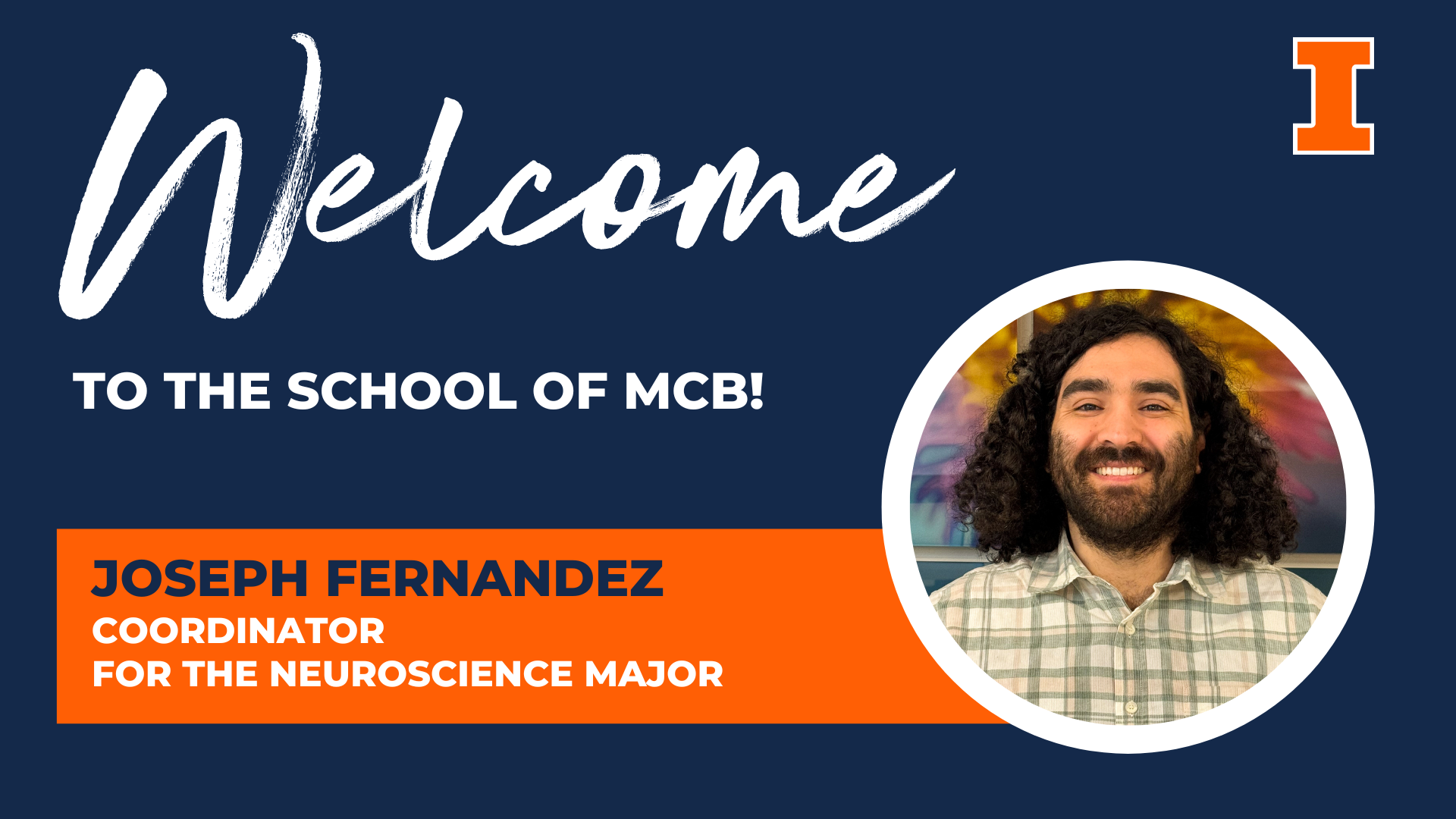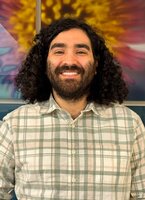
We are excited to welcome Joseph Fernandez, PhD, to the School of MCB's Instructional Program team. Dr. Fernandez joined the school in March as the new Coordinator for the Undergraduate Major in Neuroscience. We spoke with him recently to learn more about his path to neuroscience, the University of Illinois Urbana-Champaign, and the School of MCB.
What drew you to being an advisor for the School of MCB?
Last year I was a postdoc in the laboratories of Dr. Cari Vanderpool and Dr. Katy Heath. My fiancée also just finished a residency with the veterinarian school, so I have been a part of the UIUC community for a few years now. My postdoc advisors were so amazing and showed me what quality mentoring means. Throughout my postdoc, I was working through burnout from research. I looked back at my fondest memories during my academic career, and they were often when I was mentoring or teaching students. I have had such a positive time with the people in MCB that when I saw the job posting, I knew I had to apply to the Coordinator for the Undergraduate Major in Neuroscience. I love the School of MCB and the people in it, and I love working with students and helping them achieve their goals!
Can you share a little bit about yourself, including your academic and career history? What motivated you to pursue these fields?
I went to Yale University for my undergraduate degree and received a BS in psychology with a focus in neuroscience. I was also premed during my time at Yale. I originally wanted to go to medical school for neurosurgery, but after years of debate decided to pursue a PhD instead. After my undergraduate degree, I researched the neural underpinnings of autism at the Yale School of Medicine for two years. In this lab I got my first publication, however, I was still uncertain what career path I wanted. I took a few more years of to explore, living in Washington D.C. and Dakar, Senegal. After this time, I finally decided to pursue a degree back in the states.
I ended up getting my PhD in biomedical engineering from Purdue University. While I was an undergraduate, I was already making steps to move from psychology to biomedical engineering. When I was in high school (2004-08), no schools in my area had engineering classes or clubs, and it wasn’t until half-way through my Yale experience I got to learn what the field was. I was immediately interested in biomedical engineering and how engineers examine the human body, especially nervous system. It seemed just like how I see my research. I also am a firm believer in the importance of interdisciplinary and collaborative research, and the program at Purdue shared these views. As a PhD student my primary focus was on central nervous system trauma and disease, and particularly how that relates to a secondary cascade of oxidative stress and inflammation. I looked specifically at mild traumatic brain injury and subsequent impairments and neurodegeneration.
I completed my PhD in August 2022 and then started a postdoctoral research position at UIUC. Originally, I was looking for a postdoctoral position with UIUC because my fiancée had one more year of her training. I was pleasantly surprised when I got my position with Dr. Vanderpool and Dr. Heath. They were amazing mentors, and despite having a research focus completely left field of mine (on Rhizobia bacteria), we worked together to make a postdoc project for me that leaned on my strengths. I have a strong statistical background and was able to get some interesting bioinformatics work done last year and learn skills I have wantedfor a while.
How do you hope to help students achieve their academic and career goals? What impact do you hope to make on your students’ academic journeys?
If there is one lesson I would like to help our students learn during my time here, it is to appreciate the importance of critical thinking. As academics we should always be questioning our world and questing to make an impact for the better. We learn through asking questions and keeping an open mind to the world around us. Additionally, we all have strengths and passions. I hope that through my advising I can help students identify these strengths and passions within themselves and how to use them to achieve their academic and career goals.
As well, I hope that my own academic background can be helpful in guiding the students to success. I have a strong background in neuroscience and understand that this inherently interdisciplinary field can lead to a plethora of career opportunities. I am also a former pre-med student and PhD student; thus, I have similar experiences to our current students that I can rely to hopefully provide relevant and useful advising.
In your free time, what are some hobbies or interests that you enjoy? What makes these interesting to you?
I think that free time and expressing yourself through your hobbies is so vital to life, who we are, and our mental health. I grew up in a small town in Maine. Not only did I have a mother and grandfather who taught me to love and respect nature, I was in 4-H until I was 18. I learned a lot of interesting outdoor skills, and I was spoiled with the natural beauty Maine had to offer. I love nature, and I feel the most spirituality in my life when I am out getting my hands dirty in my garden. I love to experiment in the kitchen as well and am in my zone there. This is especially true when I get to use fresh ingredients from my garden! Woodworking is a passion of mine that I have been working on since my grandfather first taught me how to sand a board. Nature shows me beauty in the smallest things, and I cherish anytime I can be out in nature and working with my hands.
When I’m inside, my fiancée and I often play video games together. I first learned how to play video games in the late 1990s from my late grandmother. She absolutely loved the SNES game Earthbound and it was the first game I played with her. I learned throughout my life that video games can be a tool to bring families together and share fun and silly memories. When my fiancée and I sit down to a cup of tea and some Stardew Valley, I just feel at ease and know we have a great evening of fun ahead of us.
Lastly, I love to travel and explore as much as I can. There is so much in this world to explore, so many different people to meet and learn from. I know I can’t see it all, but I can try, haha! I’m a firm believer that travel and learning about other cultures is essential to us coming together as a global community. I particularly love to learn about food culture and all the differences and similarities in how we share a meal. I find a good meal is often one of the best ways to bring people together. A good meal and some hearty laughter!
What is your favorite quote? Can you share why you chose this quote and why it is meaningful to you?
I have two I’d like to share:
“Dream no small dreams for they have no power to move the hearts of men.” — Johann Wolfgang von Goethe
“Some people choose to see the ugliness in this world. The disarray. I choose to see the beauty [. . .]” — Dolores Abernathy, Westworld
I have always been a dreamer. I hope to leave this world better than I came into it and these two quotes represent important values in my life. We are all capable of doing incredible things and changing the world for the better.
